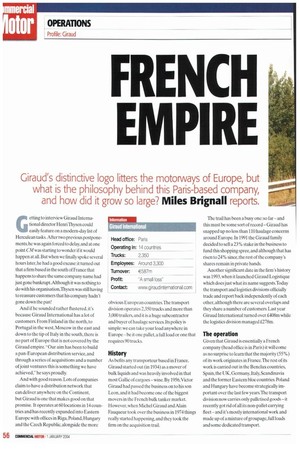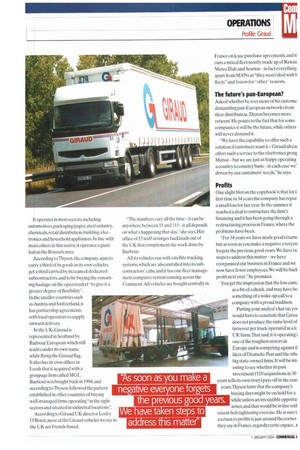FRENCH EMPIRE
Page 56

Page 57

If you've noticed an error in this article please click here to report it so we can fix it.
Giraudis distinctive logo litters the motorways of Europe, but what is the philosophy behind this Paris-based company,
and how did it grow so large? Miles Brignali reports.
Getting to interview Giraud International director Henri Thysen could easily feature on a modern-day list of Herculean tasks. After two previous postponements, he was again forced to delay, and at one point CM was starting to wonder if it would happen at all. But when we finally spoke several hours later, he had a good excuse: it turned out that a firm based in the south of France that happens to share the same company name had just gone bankrupt.Although it was nothing to do with his organisation,Thysen was still having to reassure customers that his company hadn't gone down the pan!
And if he sounded rather flustered, it's because Giraud International has a lot of customers. From Finland in the north, to Portugal in the west, Moscow in the east and down to the tip of Italy in the south, there is no part of Europe that is not covered by the Giraud empire. "Our aim has been to build a pan-European distribution service, and through a series of acquisitions and a number of joint ventures this is something we have achieved," he says proudly.
And with good reason. Lots of companies claim to have a distribution network that can deliver anywhere on the Continent. but Giraud is one that makes good on that promise. It operates at 60 locations in 14 countries and has recently expanded into Eastern Europe with offices in Riga, Poland, Hungary and the Czech Republic. alongside the more obvious European countries„The transport division operates 2.350 trucks and more than 3,000 trailers, and it is a huge subcontractor and buyer of haulage services. Its policy is simple:we can take your load anywhere in Europe be it one pallet, a full load or one that requires 90 trucks.
History
As befits any transporteur based in France. Giraud started out (in 1934) as a mover of bulk liquids and was heavily involved in that most Gallic of cargoes — wine. By 1956, Victor Giraud had passed the business on to his son Leon, and it had become one of the biggest movers in the French bulk tanker market. However, when Michel Giraud and Alain Fauqueur took over the business in 1974 things really started happening, and they took the firm on the acquisition trail. The trail has been a busy one: so far — and this must be some sort of record — Giraud has snapped up no less than 110 haulage concerns around Europe. In 1991 the Giraud family decided to sell a 23% stake in the business to fund this shopping spree, and although that has risen to 24% since, the rest of the company's shares remain in private hands.
Another significant date in the firm's history was 1993. when it launched Giraud Logistique which does just what its name suggests. Today the transport and logistics divisions officially trade and report back independently of each other, although there are several overlaps and they share a number of customers. Last year Giraud International turned over £408m while the logistics division managed £278m.
The operation
Given that Giraud is essentially a French company (head office is in Paris) it will come as no surprise to learn that the majority (55%) of its work originates in France. The rest of its work is carried out in the Benelux countries, Spain, the UK, Germany, Italy, Scandinavia and the former Eastern bloc countries. Poland and Hungary have become strategically important over the last few years:The transport division now carries only palletised goods — it recently got rid of all its non-pallet carrying fleet — and it's mostly international work and made up of a mixture of groupage, full loads and some dedicated transport. It operates in most sectors, including automotives, packaging/paper, steel industry, chemicals, retail distribution, building, electronics and household appliances. In line with most others in this sector, it operates a giant hub in the Brussels area.
According toThysen, the company aims to carry a third of its goods in its own vehicles, get a third carried by its team of dedicated subcontractors, and to be buying the remaining haulage on the open market "to give it a greater degree of flexibility". In the smaller countries such as Austria and Switzerland, it has partnership agreements with local operators to supply onward delivery.
In the UK, Giraud is represented in Scotland by Barbour European which still trades under its own name while flying the Giraud flag. It also has its own offices in Leeds that it acquired with a groupage firm called MGL. Barbour was bought back in 1994, and according toThysen, followed the pattern established in other countries of buying well-managed firms operating "in the right sectors and situated in industrial locations".
According to Giraud UK director Lesley O'Brien.most of the Giraud vehicles we see in the UK are French-based. "The numbers vary all the time it can be anywhere between 15 and 115 -ii all depends on what's happening that day." she says. Her office of 15 staff arranges backloads out of the UK that complement the work done by Barbour.
All its vehicles run with satellite tracking systems, which are also installed into its subcontractors' cabs, and it has one fleet management computer system running across the Continent. All vehicles are bought centrally in France on lease purchase agreements, and it runs a mixed fleet mostly made up of Renau Mercs, Dafs and Scanias in fact everything apart from MANs as "they won't deal with h fleets" and Ivecos for "other" reasons.
The future's pan-European?
Asked whether he sees more of his custome demanding pan-European networks from their distribution,Thysen becomes more reticent. He points to the fact that for some companies it will be the future, while others will never demand it.
"We have the capability to offer such a solution if customers want it -Giraud alrea( offers such a service to the electronics grog Matsui but we are just as happy operating a country to country basis -in each case we' driven by our customers' needs," he says.
Profits
One slight blot on the copybook is that for ti first time in 34 years the company has repor a small loss for last year. In the summer it reached a deal to restructure the firm's financing and it has been going through a restructuring process in France, where the problems have been.
"For 34 years we have made good returm but as soon as you make a negative everyon forgets the previous good years. We have tai steps to address this matter-we have reorganised our business in France and we now have fewer employees.We will be back profit next year," he promises.
You get the impression that the loss cam( as a bit of a shock, and may have be something of a wake-up call to a company with a proud tradition.
Putting your analyst's hat on, yoi would have to conclude that Girau does not produce the same level of turnover per truck/operated as a lc UK firms. That said, it is operating i one of the toughest sectors in Europe and is competing against tl likes of Deutsche Post and the oth( big state-owned firms. It will he mu esting to see whether its past investment (110 acquisitions in 30 years tells its own story) pays off in the cora years.Thysen hints that the company's buying days might be on hold for a while unless an irresistible opportu, arises, and that would be in line will recent belt-tightening exercise. He is sure t a return to profits is just around the corner. they say in France, regardez cette espace...f












































































































































































